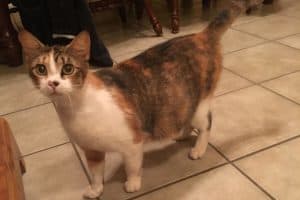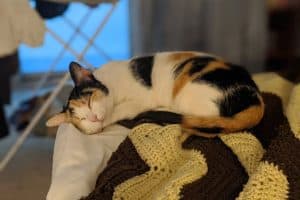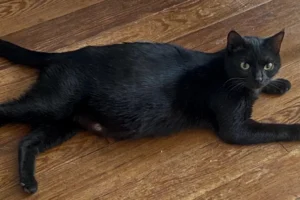Have you noticed your cat displaying behaviors that make you wonder, “Why does my cat feel pregnant?” It’s not uncommon for cat owners to be confused by their feline companion’s strange habits. In this blog post, we will explore the reasons behind this phenomenon and provide insights into what you can do to support your cat during this time.
Understanding the Symptoms of a Pregnant-Like Cat
If you’ve noticed your furry friend showing signs of what seems like pregnancy, it’s essential to understand the common symptoms. One tell-tale sign is a sudden change in behavior, such as increased affection or nesting behaviors. Physical changes, like weight gain, swollen nipples, or even a distended abdomen, could also suggest a possible pregnancy.
Keep an eye out for morning sickness, decreased appetite, or even a more prominent belly, as these are all classic signs of pregnancy in cats. Remember, though, that these symptoms can also indicate other health issues, so it’s crucial to consult with your vet for a proper diagnosis.
False Pregnancy in Cats: What You Need to Know
Did you know that cats can experience false pregnancies too? This phenomenon, also known as pseudopregnancy, can mimic the signs of a real pregnancy, causing your cat to exhibit nesting behaviors, weight gain, and even produce milk. However, there is no actual pregnancy involved.
To differentiate between a genuine pregnancy and a false one, a visit to the vet is a must. Your vet can perform tests, such as ultrasounds or hormone level checks, to confirm if your cat is truly expecting or experiencing a false alarm. Remember, false pregnancies are entirely normal in cats and typically resolve on their own without treatment.
Extra Tip: Providing your cat with a comfortable, safe space to nest and relax can help alleviate stress during a false pregnancy. Consider creating a cozy spot with blankets and toys to help your feline friend feel secure and content.
Remember, always consult with your vet for accurate diagnosis and guidance on your cat’s health and well-being.
Health Risks Associated with False Pregnancies
False pregnancies in cats can pose various health risks that owners should be aware of. One common issue is mammary gland inflammation, which can lead to discomfort and potential infection. Additionally, false pregnancies may cause hormonal imbalances that can impact your cat’s overall well-being. To ensure your cat’s health is not compromised, it is essential to monitor her closely during this time.
If you notice any signs of distress or unusual behaviors, such as excessive grooming of the mammary glands or restlessness, contact your veterinarian immediately. They can provide guidance on how to manage the symptoms and ensure your cat receives the necessary care. By staying proactive and attentive to your cat’s needs, you can help mitigate the health risks associated with false pregnancies and ensure she remains happy and healthy.
- Keep an eye out for unusual behaviors
- Monitor your cat closely
- Contact your veterinarian if you notice any concerning symptoms
For more information on false pregnancies in cats and how to care for your pet during this time, check out this helpful resource from the American Association of Feline Practitioners: False Pregnancies in Cats – AAFP
Providing Comfort and Support for Your Cat
If your cat is exhibiting pregnancy-like symptoms, it’s essential to provide them with comfort and support during this confusing time. Make sure they have a quiet, cozy space where they can rest undisturbed. Provide plenty of fresh water and nutritious food to keep them healthy.
Additionally, consider setting up a comfortable nesting area with blankets or towels where your cat can feel safe and secure. Gentle petting and reassurance can also help alleviate any stress or discomfort they may be experiencing. Remember to monitor their behavior closely and consult a veterinarian if you have any concerns about their health.
Remember, your cat is relying on you to provide them with the care and support they need during this confusing time. By creating a safe and comfortable environment, you can help them feel more at ease as they navigate these unfamiliar symptoms.
- Offer plenty of fresh water and nutritious food
- Create a cozy nesting area with blankets or towels
- Provide gentle petting and reassurance for comfort
Consulting a Veterinarian: When to Seek Professional Help
While it’s normal for cats to exhibit pregnancy-like symptoms, there are times when it’s crucial to consult a veterinarian for professional guidance. If your cat’s symptoms are severe or persistent, it’s important to seek help promptly. Remember that only a veterinarian can accurately diagnose your cat’s condition and provide appropriate treatment.
During a vet visit, the veterinarian will conduct a thorough physical examination and may recommend further tests to determine the cause of your cat’s symptoms. Be prepared to provide detailed information about your cat’s behavior and any changes you have observed. Trust your veterinarian’s expertise and follow their recommendations for the best possible outcome.
If you notice any concerning signs or your cat’s symptoms worsen, don’t hesitate to schedule a vet visit. Your cat’s health and well-being are a top priority, and seeking professional help is crucial in ensuring they receive the care they need.
- Consult a veterinarian for severe or persistent symptoms
- Provide detailed information during the vet visit
Trust your veterinarian’s expertise and follow their recommendations
For additional support and information on cat health, visit the American Association of Feline Practitioners website: American Association of Feline Practitioners
Interesting Fact: The Evolutionary Basis of False Pregnancies
Have you ever wondered why your cat sometimes seems to exhibit signs of pregnancy, despite not actually being pregnant? It turns out there is an intriguing evolutionary reason behind this phenomenon. In the wild, female cats can experience false pregnancies as a way to ensure the survival of their offspring. By displaying behaviors associated with pregnancy, such as nesting and increased appetite, female cats can trick potential predators into thinking they are pregnant and thus avoid harm to their actual kittens. This fascinating aspect of feline biology showcases the adaptability and resourcefulness of cats in the wild.
Why Does My Cat Feel Pregnant?
If you notice your cat displaying symptoms similar to pregnancy, such as weight gain, enlarged nipples, and nesting behavior, it may be experiencing a false pregnancy. This condition, known as pseudopregnancy, is caused by hormonal fluctuations that mimic the physical signs of pregnancy. While false pregnancies are more common in unspayed female cats, spayed cats can also experience pseudopregnancy due to residual ovarian tissue producing hormones. It’s essential to consult with your veterinarian to rule out any underlying medical issues and discuss potential treatment options, such as hormone therapy or behavior modification techniques to help your cat feel more comfortable.
Signs to Watch For:
- Weight Gain: Cats experiencing pseudopregnancy may gain weight due to hormonal changes.
- Enlarged Nipples: Your cat’s nipples may become swollen and more prominent during a false pregnancy.
- Nesting Behavior: Your cat may exhibit nesting behavior, such as rearranging bedding or seeking out secluded spots to rest.
- Increased Appetite: Some cats with false pregnancies may have an increased appetite, similar to pregnant cats preparing to nurse kittens.
- Mammary Gland Enlargement: The mammary glands of a cat undergoing a false pregnancy may become enlarged and appear more pronounced.
Remember, while false pregnancies in cats can be confusing and concerning, they are a natural part of feline biology and can be managed with proper care and guidance from your veterinarian. By understanding the evolutionary basis of false pregnancies and recognizing the signs of pseudopregnancy in your cat, you can ensure they receive the support and care they need during this unique physiological phenomenon.
Alex, a passionate animal lover, has experience in training and understanding animal behavior. As a proud pet parent to two dogs and three cats, he founded AnimalReport.net to share insights from animal experts and expand his knowledge of the animal kingdom.




